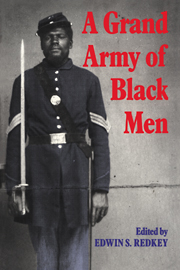Book contents
- Frontmatter
- Contents
- Preface
- Acknowledgments
- List of Abbreviations
- Introduction: For Freedom and Equality
- 1 Black Soldiers in White Regiments
- 2 South Carolina, Georgia, and Florida
- 3 Virginia and North Carolina
- 4 The Gulf States
- 5 Occupation Duty
- 6 For the Rights of Citizens
- 7 The Struggle for Equal Pay
- 8 Racism in the Army
- 9 The Navy
- 10 War's End
- Index
- Cambridge Cultural Social Studies
7 - The Struggle for Equal Pay
Published online by Cambridge University Press: 24 March 2010
- Frontmatter
- Contents
- Preface
- Acknowledgments
- List of Abbreviations
- Introduction: For Freedom and Equality
- 1 Black Soldiers in White Regiments
- 2 South Carolina, Georgia, and Florida
- 3 Virginia and North Carolina
- 4 The Gulf States
- 5 Occupation Duty
- 6 For the Rights of Citizens
- 7 The Struggle for Equal Pay
- 8 Racism in the Army
- 9 The Navy
- 10 War's End
- Index
- Cambridge Cultural Social Studies
Summary
SERGEANT WILLIAM WALKER, an escaped slave, marched with others of his company to the tent of their commander. Lieutenant Colonel Augustus G. Bennett, of the Third South Carolina Infantry (Colored), watched as the black men stacked their rifles and ammunition belts. “What does all this mean?” he asked. Sergeant Walker replied that he and his men were “not willing to be soldiers for seven dollars per month, ” about half what white privates were paid. He called them “an assemblage who only contemplated a peaceful demand for the rights and benefits that had been guaranteed them.” The colonel told them that what they were doing was against army regulations; they should pick up their arms and return quietly to their quarters. But the men disobeyed his order, returning to their tents without their rifles, and Sergeant Walker, their leader, was charged with inciting a mutiny. He was court-martialed, convicted, and sentenced to die. A firing squad shot him on February 29, 1864, for wanting equal pay.
Sergeant Walker carried his protest beyond legal limits, and he paid an extreme penalty for it. Many other African-American soldiers, especially the free men from the North, also resented their inferior pay – but instead of refusing duty, they protested by declining any pay at all until they would be paid the same as white soldiers. They also wrote letters complaining that they had been promised a soldier's pay and would not accept “a laborer's pay.”
- Type
- Chapter
- Information
- A Grand Army of Black MenLetters from African-American Soldiers in the Union Army 1861–1865, pp. 229 - 248Publisher: Cambridge University PressPrint publication year: 1992



